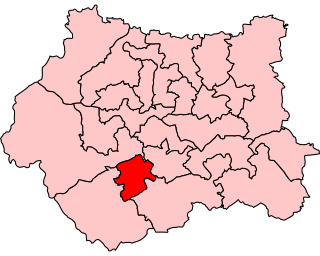
City of Durham is a constituency represented in the House of Commons of the UK Parliament since 2005 by Roberta Blackman-Woods of the Labour Party.

Huddersfield is a constituency represented in the House of Commons of the UK Parliament since 1983 by Barry Sheerman of the Labour Co-operative Party.
Morpeth was a borough constituency centred on the town of Morpeth in Northumberland represented in the House of Commons of the Parliament of England until 1707, the Parliament of Great Britain from 1707 to 1800, and then the Parliament of the United Kingdom.
Bewdley was the name of a constituency of the House of Commons of the Parliament of the United Kingdom from 1605 until 1950. Until 1885 it was a parliamentary borough in Worcestershire, represented by one Member of Parliament; the name was then transferred to a county constituency from 1885 until 1950. Its MPs included the former Prime Minister Stanley Baldwin, who represented the seat from 1908 to 1937, and afterwards took the name of the constituency as part of his title when he was raised to the peerage.
Derby is a former United Kingdom Parliamentary constituency. It was a constituency of the House of Commons of the Parliament of England, then of the Parliament of Great Britain from 1707 to 1800 and of the Parliament of the United Kingdom from 1801 to 1950. It was represented by two members of parliament. It was divided into the single-member constituencies of Derby North and Derby South in 1950.

Petersfield was an English Parliamentary constituency centred on the town of Petersfield in Hampshire. It existed for several hundred years until its abolition for the 1983 general election.
Hythe was a constituency centred on the town of Hythe in Kent. It returned two Members of Parliament to the House of Commons until 1832, when its representation was reduced to one member. The constituency was abolished for the 1950 general election, and replaced with the new Folkestone and Hythe constituency.
Carmarthenshire was a parliamentary constituency in Wales which returned one Member of Parliament to the House of Commons of the Parliament of the United Kingdom until its representation was increased to two members for the 1832 general election.
Cricklade was a parliamentary constituency named after the town of Cricklade in Wiltshire.
Evesham was a parliamentary constituency in Worcestershire which was represented in the British House of Commons. Originally a parliamentary borough consisting of the town of Evesham, it was first represented in 1295. After this its franchise lapsed for several centuries, but it then returned two Members of Parliament (MPs) from 1604 until 1868, when its representation was reduced to one member under the Representation of the People Act 1867.
Boston was a parliamentary borough in Lincolnshire, which elected two Members of Parliament (MPs) to the House of Commons from 1547 until 1885, and then one member from 1885 until 1918, when the constituency was abolished.
Nottingham was a parliamentary borough in Nottinghamshire, which elected two Members of Parliament (MPs) to the House of Commons from 1295. In 1885 the constituency was abolished and the city of Nottingham divided into three single-member constituencies.
David Chadwick was an English accountant and Liberal Party politician. He sat in the House of Commons from 1868 to 1880.
Thomson Hankey was a British merchant, a banker and a Liberal Party politician.
The Stroud by-election of July was fought on 24 July 1874, due to the election of the incumbent Conservative MP, John Edward Dorington being declared void on petition, due to "bribery, treating, and undue influence".
The Poole by-election of 1874 was held on 26 May 1874. It was caused by the election being declared void on petition, after "corrupt conduct and treating". It was retained by Liberal MP, Henry Brinsley Sheridan.
Thomas Kemp Sanderson was an English corn merchant from Wakefield in the West Riding of Yorkshire, and a Conservative Party politician.
Charles Waring was a Liberal Party and Liberal Unionist Party politician.




